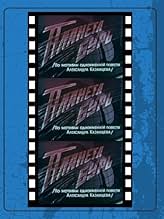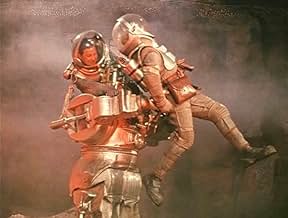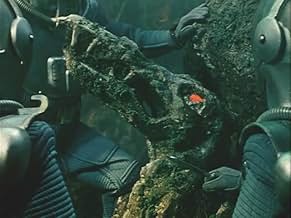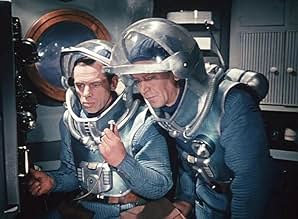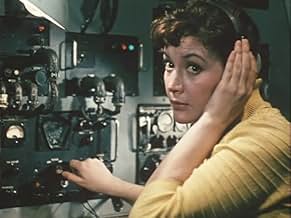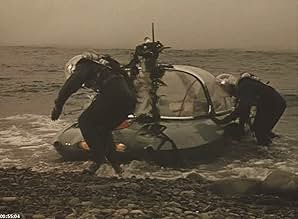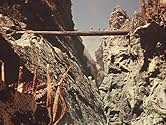IMDb RATING
6.3/10
1.6K
YOUR RATING
Cosmonauts land on the planet Venus. However, they find themselves in danger from the voracious monsters they find on it.Cosmonauts land on the planet Venus. However, they find themselves in danger from the voracious monsters they find on it.Cosmonauts land on the planet Venus. However, they find themselves in danger from the voracious monsters they find on it.
- Director
- Writers
- Stars
- Director
- Writers
- All cast & crew
- Production, box office & more at IMDbPro
Featured reviews
10timayres
I saw this in my childhood and took years to track it down again since I saw it under one of its two confusing Roger Corman english-language re-edits [Voyage to the Prehistoric Planet with Basil Rathbone added, and Voyage to the Planet of Prehistoric Women, with mermaids scenes directed by Peter Bogdonavich.] Finally able to track down the original Russian version recently, I was able to fully appreciate the ambitious scope and production values. The forest is truly primeval in its detailed beauty, Robot John both heroic and sad in his dedication, and the ending poetic and lyrical. Non-U.S. science fiction films are doubly exotic, and this one is classic fare.
Pavel Klushantsev, who directed more Russian SF films than he's credited with here, found himself propelled from obscurity into sudden demand by the Soviet authorities when the production of his 1958 SF debut, 'Road to the Stars' coincided with the launch of Sputnik. Although he languished in almost total obscurity in the West, his films were enormously popular in the USSR, and, as a recent documentary noted, many of his cinematic innovations were 'borrowed' 10 years later by Kubrick in '2001'.
Planet of Storms is not a great movie, but compared with most of the SF which the USA was churning up to this time, it's positively stellar. It's weakest points are its sketchy characterisations, and rather poor pacing, but hard SF luminaries like Gernsback and John Campbell would probably have admired its attention to detail, and relative lack of sensationalism. The film actually begins with the disclaimer "Venus may well be entirely different to this" (or somesuch), and what follows is a serious attempt to depict a Venusian expedition - marred perhaps by the odd dinosaur, but surprisingly free of Soviet chest-thumping.
Planet of Storms won't blow your mind, but you'll find yourself being charmed by the ingenious photography, sets, creatures, etc. There's also a straight out hilarious scene where the Robot gets rained on, and goes off his head. While his two human companions are lying on the ground, dangerously ill from fever, he's babbling on about building a concrete highway to reach the other half of the expedition, who are are about 20 miles away. Contacting him via radio, they are somewhat alarmed to hear him tell them "According to quotes from the Smith corporation, the cost of building a highway to the Sirius is 37 million dollars". I don't know if this was a dig at capitalism, but it cracked me up anyway.
Now - some bloke wanted a translation of the lyrics to the song. These are courtesy of SBS TV Australia (translated by Elena Mikrailik and Brendan Doyle)
(first version)
Planet of Storms, we thank you for your lessons / We enjoyed our stay, but now we must be gone / Our ship awaits; our way is clear and straight / Our hearts are calling, "home, home home" / Yes, home, dear Comrades //
It's time to calculate the points of bearing / It's time to place our courage at the helm / She waits for us, the planet of our birth / Our dear home; our one and only Earth / Yes, Earth / Earth, dear Comrades //
(end of movie version)
Planet of Storms, we'll see you soon, don't worry / And in your harbour, our ships will gladly berth / For not in vain are we the sons of Earth / For not in vain are we the sons of Earth / Earth, dear Comrades
Planet of Storms is not a great movie, but compared with most of the SF which the USA was churning up to this time, it's positively stellar. It's weakest points are its sketchy characterisations, and rather poor pacing, but hard SF luminaries like Gernsback and John Campbell would probably have admired its attention to detail, and relative lack of sensationalism. The film actually begins with the disclaimer "Venus may well be entirely different to this" (or somesuch), and what follows is a serious attempt to depict a Venusian expedition - marred perhaps by the odd dinosaur, but surprisingly free of Soviet chest-thumping.
Planet of Storms won't blow your mind, but you'll find yourself being charmed by the ingenious photography, sets, creatures, etc. There's also a straight out hilarious scene where the Robot gets rained on, and goes off his head. While his two human companions are lying on the ground, dangerously ill from fever, he's babbling on about building a concrete highway to reach the other half of the expedition, who are are about 20 miles away. Contacting him via radio, they are somewhat alarmed to hear him tell them "According to quotes from the Smith corporation, the cost of building a highway to the Sirius is 37 million dollars". I don't know if this was a dig at capitalism, but it cracked me up anyway.
Now - some bloke wanted a translation of the lyrics to the song. These are courtesy of SBS TV Australia (translated by Elena Mikrailik and Brendan Doyle)
(first version)
Planet of Storms, we thank you for your lessons / We enjoyed our stay, but now we must be gone / Our ship awaits; our way is clear and straight / Our hearts are calling, "home, home home" / Yes, home, dear Comrades //
It's time to calculate the points of bearing / It's time to place our courage at the helm / She waits for us, the planet of our birth / Our dear home; our one and only Earth / Yes, Earth / Earth, dear Comrades //
(end of movie version)
Planet of Storms, we'll see you soon, don't worry / And in your harbour, our ships will gladly berth / For not in vain are we the sons of Earth / For not in vain are we the sons of Earth / Earth, dear Comrades
Not bad, not incredible like "Forbidden Planet" and not as colourful and tragic as "This Island Earth" and it is certainly not "Solaris". But we must give 60s Eastern bloc science fiction its due. None of it is bad. All of it respects the intelligence of the viewers and each manages to create effective atmospheres. The music and background sound were good. The robot and the "supercar" are dated but very good for the time. Naming the robot "John" is a bit of a dig at the West (one could just as easily see Westerners naming a robot Ivan or Igor). The robot is given a Western name while the crew are all self actualized socialist men except for the woman cosmonaut who is given the traditional role of minding the mothership and lamenting over the fate of the men who are off exploring the planet. If that and the song are the social commentary then it could have been much worse.
If one wants to learn some Russian (which I would like to do if I could find the time), then this film would give some insights.
I bought the version from Sinister Cinema which seems to be missing the first half and so it starts with the cosmonauts discussing a tragic collision in space as they prepare to embark on a trip to Venus. It is in Russian with English subtitles and the special effects and the background music are both awesome. The story is pretty straight forward about a Russian expedition to the planet Venus, their encounter with dinosaurs and other strange life forms, philosophical discussions about the role of man in space, speculation about extraterrestrial intelligent life, and an ironic ending in which intelligent humanoid life is shown to exist on Venus, yet there is no contact between them and earth-born humans. Perhaps the writers intended a sequel.
Just like a lot of the German films from the 1930s, there is very little or no ideological propaganda, even though there is one reference to the Communist Party, Government, and the Soviet Union (thankfully a thing of the past). But aside from that single sentence, there is no reference to anything political. The story centers around a group of cosmonauts that represent not just Russia, but all of humanity as a whole as the crew embarks on an exploratory mission of the planet Venus. Recommended highly.
Dan Basinger
I bought the version from Sinister Cinema which seems to be missing the first half and so it starts with the cosmonauts discussing a tragic collision in space as they prepare to embark on a trip to Venus. It is in Russian with English subtitles and the special effects and the background music are both awesome. The story is pretty straight forward about a Russian expedition to the planet Venus, their encounter with dinosaurs and other strange life forms, philosophical discussions about the role of man in space, speculation about extraterrestrial intelligent life, and an ironic ending in which intelligent humanoid life is shown to exist on Venus, yet there is no contact between them and earth-born humans. Perhaps the writers intended a sequel.
Just like a lot of the German films from the 1930s, there is very little or no ideological propaganda, even though there is one reference to the Communist Party, Government, and the Soviet Union (thankfully a thing of the past). But aside from that single sentence, there is no reference to anything political. The story centers around a group of cosmonauts that represent not just Russia, but all of humanity as a whole as the crew embarks on an exploratory mission of the planet Venus. Recommended highly.
Dan Basinger
"Planeta Bur" is about cosmonauts who are lost on Venus, attempting to return to the spaceship, and their adventures along the way, which include encounters with prehistoric reptiles, a volcano, and other perils. Like Ptushko's "Sadko", this is a true gem of fantastic film. The use of natural and artificial sets is very effective in creating an atmospheric, alien world; the monsters (an intelligent robot, a carnivorous plant, pestiferous lizard men, a pterodactyl, and some other dinosaurs) are similarly well done. Unlike American films of this kind, there is no emphasis on macho violence or digressions into "steamy" romance scenes; instead the film concentrates on the lavish visuals in an unhurried and dignified pace. My only complaints are that the introduction is too long and slow-moving, and that the subplot involving Masha's agonizing over the fate of her comrades isn't very interesting; but the scenes on Venus, which comprise the bulk of the film, more than make up for these flaws. "Planeta Bur" was drastically edited by Peter Bogdonavitch and released in the States as "Voyage to the Planet of Prehistoric Women"; two versions exist, one with footage of Mamie Van Doren leading a tribe of telepathic Venusian women and worshipping the pterodactyl of the original film, the other without Ms. Van Doren or any of the prehistoric reptile footage.
Did you know
- TriviaThis movie is later edited and dubbed as "Voyage to the Prehistoric Planet", released in the US in 1965. This movie (and the Russian inserts) were in turn used to create "Voyage to the Planet of Prehistoric Women" (1968)
- Alternate versionsFor the U.S. version, titled Voyage to a Prehistoric Planet (1965), all footage of Kyunna Ignatova has been removed and replaced with footage of American actress Faith Domergue playing the same part.
- ConnectionsEdited into Voyage sur la planète préhistorique (1965)
- How long is Planeta bur?Powered by Alexa
Details
- Runtime1 hour 18 minutes
- Sound mix
- Aspect ratio
- 1.37 : 1
Contribute to this page
Suggest an edit or add missing content

Top Gap
By what name was La planète des tempêtes (1962) officially released in Canada in English?
Answer
